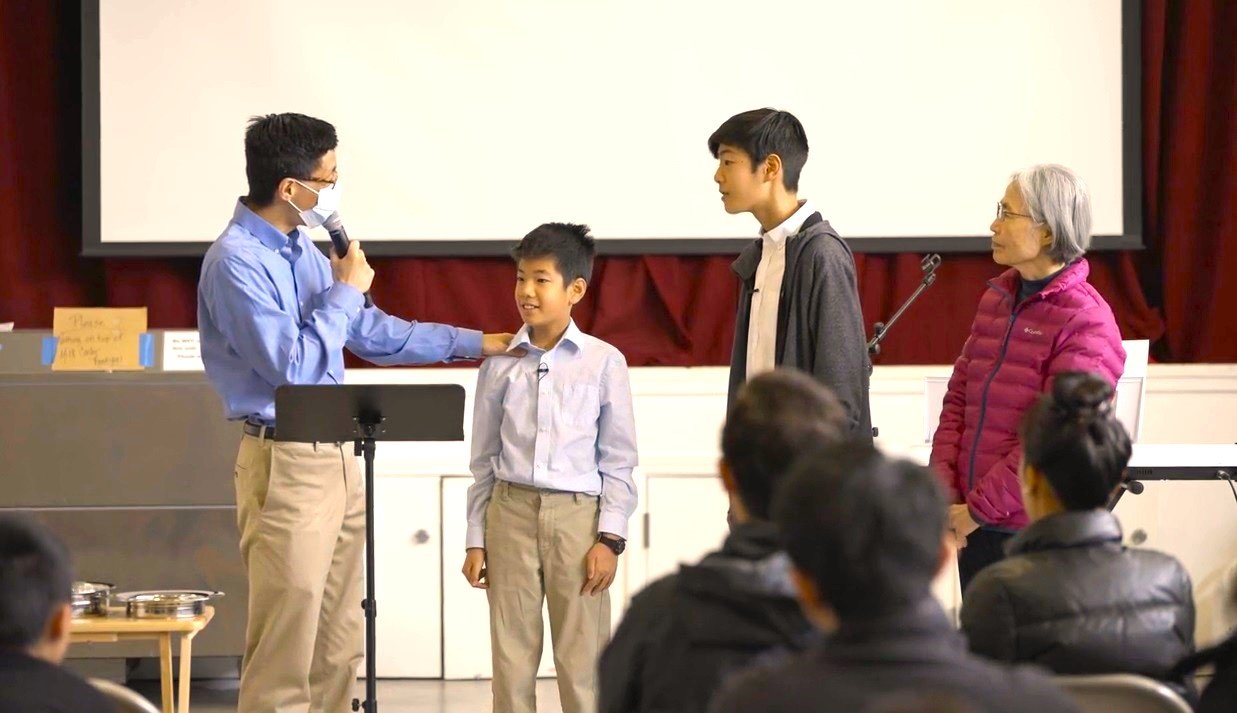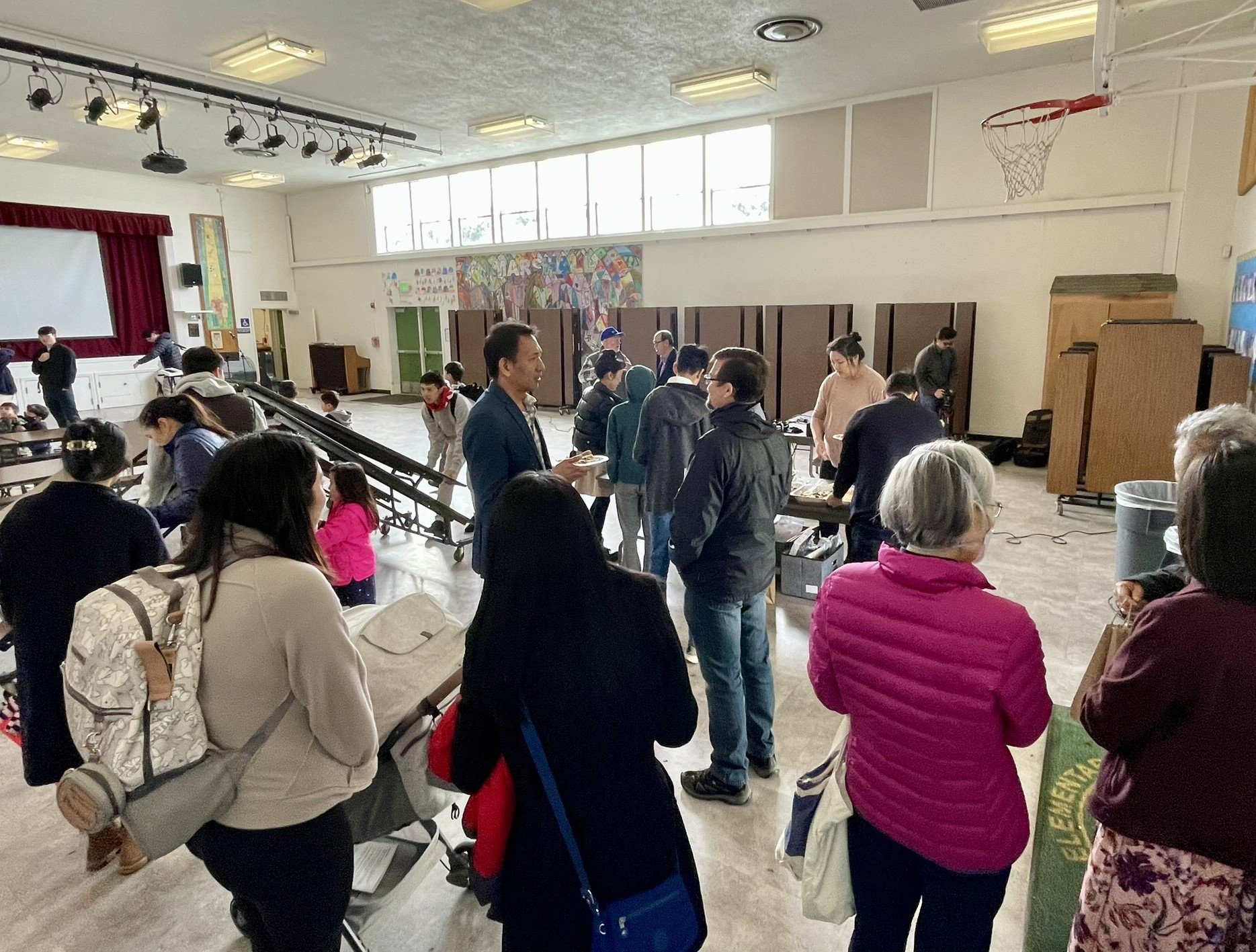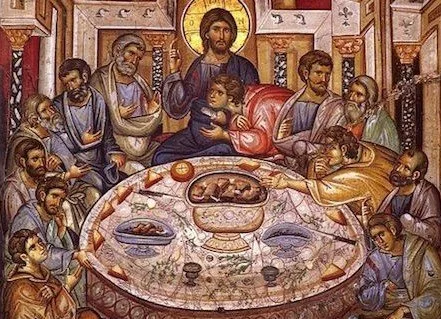
Imago Dei Blog
Heaven is a Feast
In last Sunday's sermon about the siege of Samaria, we looked at how the story concludes with a joyful feast after a long and terrible famine. This is the image of salvation given to us in the Bible. Jesus repeatedly evokes this image in his parables on the Kingdom of God.
The essential element of a feast is that it is communal. It's the people that makes the feast so joyful and festive. We all eat alone at times. But there's something special and wonderful in gathering together with good friends to share a meal. This is why we gather together as a church each Sunday. The Christian life is not a solitary endeavor, but a communal project. Which makes each Sunday a small taste of heaven.
Image: catered lunch from this past Sunday
Baptisms
This past Sunday, Steven and Emilia Cheung were baptized. It was a beautiful celebration of God's grace and goodness in their lives. The congregation pledged to assist Jen and Steven in their parental responsibilities to raise Emilia in the nurture and discipline of the Lord. This was a wonderful reminder that the church is a spiritual family, and that the children of the church grow up with many spiritual uncles and aunts watching over them. As Christians, we are not alone, but we belong to the family of God. This is a wonderful comfort and encouragement for our lives.
The gospel is for families
The gospel is not just for individuals, but whole families. You see this pattern in the New Testament where entire households come to faith in Christ together. You also see instructions for believers to teach their children faith in Christ. This is God’s beautiful design — that salvation should come, not just to individuals, but to entire families.
This past Sunday, my sons, Judah and Noah, each gave their testimonies before the church and were confirmed in their faith. This was a special joy for Christina and I. Our hearts were full of thanksgiving and praise. My mom, Haesook Chae, also became a member of the church. It was a wonderful time of celebration and fellowship for the church.
A Vision for Imago
At our last congregational meeting, we discussed how the whole of the Christian life is love. Love is not a solitary activity, but only a community effort since we need others to receive our love. And love is not mere sentiment, but action and meeting the practical needs of others. Ultimately, God is love (1 John 4:8). One of the reasons for our name is that we might imitate God, particularly his love.
The vision for our church is we want to be a community where we love one another deeply. Jesus said, “the world will know that you are my disciples when you love one another” (John 13:35). The modern Western world is the most prosperous and technologically sophisticated time in human history. But we are also the loneliest and most isolated. San Mateo recently declared a public health emergency of loneliness. Human beings were built for connection because we are made in the image of God. The church is where we begin to heal and be restored as we embrace and care for one another as brothers and sisters in Christ.
You can listen to a sermon on this vision of the church as a community of love here:
Sharing the Gospel in the Bay Area
"And how are they to believe in him of whom they have never heard?" -- Romans 10:14
One of the great challenges of the Bay Area is the subtle but very clear disapproval of evangelism. And so, Christians are often afraid of giving offense. However, the very purpose of the Christian life is to participate in the growth of the Kingdom of God (Matthew 28:18-20).
Here are some practical steps to doing evangelism:
Let people know you are a Christian.
Be a good friend and a good worker, so that you have the credibility to share Christianity.
Pray for open doors and opportunities. You will be surprised how God answers your prayers.
Finally, take courage and share Christ with a friend!
Here is a final thought. If you believe the Bible, then you believe your unbelieving friend is going to hell without Christ. Even though they may disagree with you, they will greatly respect you if you care about them enough to tell them they are lost without Christ. Take courage! Maybe this is the very reason you are their friend -- that they might be saved through you.
Reflections on Community
One of the most striking descriptions of the early church is found in Acts 2:46-47: "And day by day, attending the temple together and breaking bread in their homes, they received their food with glad and generous hearts, praising God and having favor with all the people."
What stands out is the expression, "day by day." The early Christians spent time together every day. They loved being together. They couldn't get enough of each other. They met for worship in the Temple; they gathered in each others homes; they were constantly sharing life together.
One of the hallmarks of modern life is social isolation. About half of Americans report feeling acute loneliness and disconnection. There are just so many barriers to social connection nowadays. I can see it in my own children. I remember when I was a kid, anytime I wanted to hang out with a friend, I would just hop on a bike and knock on his door. Many times, there were kids playing out in the streets, and I would just go out and join them. But now, almost all social interactions for kids have to be arranged and planned. As a result, there are just less opportunities to be with friends.
One of the great blessings of church is this rhythm and expectation of communal life. A central aspect of church is meeting together frequently -- to worship, to pray, and to just be together. This is God's good design. He created human beings to enjoy deep fellowship and spiritual life together. What a blessing from our heavenly Father.
Image: "The Last Supper" by Michael Damaskinos (1591)
Knowing God
There is a difference between knowing about God and knowing God. It's the difference between knowing facts about God, like reading a history book about Abraham Lincoln, and truly knowing God, like knowing a good friend. It's the difference between mere intellectual understanding and a fulsome heartfelt experience. For too many Christians, we may know facts about God, but we don't truly know God in our inner being.
But we want to. How do we move from simply hearing about a good meal to actually tasting and experiencing that meal? Psalm 34:8 says "taste and see that the Lord is good." How do we actually experience the grace of God, so that we're profoundly moved by the greatness of God's love and forgiveness?
Jeremiah 29:13 says, "you will seek me and find me when you seek me with all your heart." The answer is that it takes intentional effort and perseverance to know God. He has invited us into a relationship with him. But we must accept that invitation through the various means of grace--studying Scripture, ardent prayer, consistence in church, regular fellowship, serving with joy, courageous evangelism. A living, vital relationship with God is a journey of faith, not a passive event. For 2024, let us renew our commitment to walking that journey.
The problem of anxiety and the “peace of God”
We live in an anxious age. According to the National Institute of Mental Health, 1 in 5 Americans experienced an anxiety disorder in the past year, and 1 in 3 will in their lifetimes. But we don’t need statistics to tell us something we all know. Because we all feel it, especially in the Bay Area. The uncertainty of life. Every day is a struggle. The constant sense of dread and fear. It’s the air we breathe.
And yet the Bible speaks of the “peace of God” (Philippians 4:7). What is it? It is a deep calm and emotional steadiness that transcends all circumstances. It doesn’t depend on the absence of troubles – but exists in the middle of troubles. It doesn’t mean detachment from people and their problems – but deeply loves people so that their troubles become yours. So then how is such peace possible?
This peace comes from a deep confidence and trust in God’s wise control of life. It is a peace based on God’s sovereign rule of the universe, so that all things are going according to his good and wise plan. Often, we don’t understand his plan. Often, it seems like the plan is going off the rails! But this peace comes from a deep trust in the character of God. So that we don’t need to know the exact details of how the story ends, because we know the Author of the story is good! He is also an exciting author, and there will be surprising twists and turns in the story, but in the end, when we finally read the story in its totality, we will be overwhelmed with joy and thanksgiving. Peace comes from knowing that beforehand.
The Storm on the Sea of Galilee by Rembrandt (1632)
The world is filled with problems and troubles. Everything is in flux. Nothing is solid. But peace come from standing upon God as the unshakeable rock. That’s why we can be steady. Not because we have a steely temperament, but because we are rooted in God. Or to switch metaphors, with Jesus in the boat with us, we can face all of life’s storms (Mark 4:35-41).
“The Lord is at hand; do not be anxious about anything. And the peace of God, which surpasses all understanding will guard your hearts and your minds in Christ Jesus.” (Philippians 4:5-7)
Jesus and Elijah
We have been doing a sermon series on the life of Elijah. There is a relatively obscure story of Elijah in 2 Kings 1, where King Ahaziah sends soldiers to arrest the prophet, but Elijah calls down fire from heaven and the soldiers are destroyed.
Despite its relative obscurity, this Old Testament text is evoked several times in the Gospels. For example, in the Gospel of Luke, when a village rejects Jesus, the disciples indignantly ask, “Lord, do you want us to call fire down from heaven to destroy them?” (Luke 9:54). The disciples were undoubtedly thinking of Elijah calling down fire from heaven in 2 Kings 1. But the most stunning reference is at the cross. Each of the Synoptic Gospels record that some in the crowds thought Jesus was calling out to Elijah.
The text is worth citing in full:
And about the ninth hour Jesus cried out with a loud voice, saying, “Eli, Eli, lema sabachthani?” that is, “My God, my God, why have you forsaken me?” And some of the bystanders, hearing it, said, “This man is calling Elijah.” And one of them at once ran and took a sponge, filled it with sour wine, and put it on a reed and gave it to him to drink. But the others said, “Wait, let us see whether Elijah will come to save him.” And Jesus cried out again with a loud voice and yielded up his spirit. (Matthew 27:46-50)
Now, why mention this detail about Elijah? If this was simply a case of mispronunciation or mis-comprehension (‘God’ and ‘Elijah’ sound similar in Aramaic), why include this detail? The gospel writers are quite spare and selective in the details they do include about the crucifixion. It must be that this particular detail about Jesus calling out to Elijah was significant.
The story in 2 Kings 1 provides the rich context. Essentially, 2 Kings 1 is the story of God sending down fire to protect Elijah from hostile soldiers. Many people thought Jesus was Elijah or a prophet in the mold of Elijah (Mark 8:28). And so, the crowds at the cross were shocked that the Romans were able to do what King Ahaziah tried but failed to do – lay hands on God’s prophet. Either, Jesus was crying out to Elijah in stunned betrayal, or he was finally calling down fire to destroy the Roman soldiers, like Elijah.
But nothing happened and Jesus perished on the cross. This was almost incomprehensible to Jesus’ followers. It was only after the Resurrection, they would come to understand that Jesus did not come to bring the fire of God’s judgment, he came to bear it. The reason fire did not come down on the Romans was because it came down on Jesus. This is why he cried out, “My God, my God, why have you forsaken me?” On the cross, Jesus experienced the fire of God’s wrath and judgment.
All throughout the Old Testament, we’re given these little glimpses and previews of the coming of Jesus Christ. And all throughout the Gospel accounts, there are repeated references and citations of Old Testament texts that help us understand the fullness of Jesus’ redemptive acts. The Old and New Testaments are a single, seamless story of God rescuing his people from sin and death, and therefore, reading the Old Testament makes the New Testament that much more vivid and impactful.
You can listen to the sermon on 2 Kings 1 here:
Images:
Top: Elijah Destroying the Messengers of Ahaziah by Gustave Dore (1883)
Bottom: Crucifixion by Agnolo Gaddi (1396)
“Make it your ambition to lead a quiet life”
One of the books that encouraged me the most this last year was reading Memoirs of an Ordinary Pastor. It's the story of an ordinary pastor named Tom Carson, who devoted his life to ministry for 33 years (14 years in his first church, 19 years in his second church). In the end, he never reached any great acclaim or heights of renown. He was just a humble, faithful pastor.
Paul writes, "make it your ambition to lead a quiet life" (1 Thessalonians 4:11). It's seems like a paradox. Our highest ambition should be a quiet life. But through a gospel lens, it is the power of God. Weakness and lowliness are not failure and defeat. It is depending deeply on the sufficiency of God in all things. And when we do that, we experience the power of God in our lives.
D.A. Carson
We would have never heard of Tom Carson, except his son happened to be D.A. Carson, one of the most prolific Christian writers and theologians. When his father died, he inherited his journals and letters from ministry. As he was going through them, he was so moved, he decided to publish them as a book. When you read Tom’s journals, you see how much he struggled with discouragement and feelings of inadequacy. He chronicled all the tumultuous ups and downs of ministry, intractable conflicts and problems in his church. He labored in relative obscurity, but through it all, he remained faithful.
At the end of his life, D.A. Carson wrote this of his father:
Tom Carson never rose very far in denominational structures, he never pastored a church over 40 people, he never wrote a book. He was not wealthy or powerful. When he died, there were no crowds outside the hospital, no editorial comments in the papers, no announcements on television, no attention paid by the nation. In his hospital room, there was no one by his bedside. There was only the quiet hiss of oxygen, vainly venting because he had stopped breathing and would never need it again. But on the other side, all the trumpets sounded. Dad won entrance to the only throne room that mattered. And he heard the voice of Him whom he longed to hear, saying, “well done, good and faithful servant; enter into the joy of your Lord.”



















